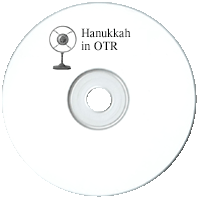

Hanukkah is commonly referred to as "the Festival of Lights" and the word means "to dedicate".

4 old time radio show recordings
(total playtime 1 hours, 53 min)
available in the following formats:
1 MP3 CD
or
2 Audio CDs
Text on OTRCAT.com ©2001-2026 OTRCAT INC All Rights Reserved. Reproduction is prohibited.

Some merchants think of Hanukkah as the time Jews give Christmas presents, gift giving is not an important part of the Hanukkah tradition (unless, of course, you are a kid hoping to receive a favorite toy). Feasting, singing, game playing, and family get-togethers are traditional parts of the Hanukkah celebration, and it is considered a joyous time.
Hanukkah is commonly referred to as "the Festival of Lights" and the word means "to dedicate". The Torah, which is the central Jewish religious text, does not refer to Hanukkah because the events which inspired the holiday occurred long after it was written, but the New Testament does refer to Jesus attending "a Feast of Dedication". Before 200 BCE, Judea was under the rule of Ptolemaic Egypt which was very liberal concerning religious tolerance. However, the Ptolemies were overthrown by the Hellenistic Syrian Empire who sought to impose their beliefs on their subjects. The Temple in Jerusalem was looted and an altar to Zeus erected.

The central symbol of Hanukkah is a nine-branched candelabrum or menorah. The central, or "helper" candle is used to light the others, and each night of the eight-day celebration an additional candle is lighted. As previously mentioned, gift giving is not a traditional part of the celebration but many families do exchange presents on one or more nights during Hanukkah. Traditional Hanukkah foods are often fried or baked in olive oil, like latkes (potato pancakes) or doughnuts filled with fruit jellies. Children often play with a four-sided top called a dreidel, and Hanukkah gelt, or money, is traditionally distributed on the fifth night.
The Eternal Light was broadcast on NBC between 1944 and 1989 and was produced with the cooperation of the Jewish Theological Seminary of America.
See also: Yiddish Old Time Radio and Presidential Hanukkah Recordings.
Text on OTRCAT.com ©2001-2026 OTRCAT INC All Rights Reserved. Reproduction is prohibited.
You have reached the maximum number of votes for a unregistered user.
Please login or create a new account to continue...
You have reached the maximum number to down votes in this page.



Hanukkah Disc A001
|
Add Audio CD to Cart - $5.00 |
Hanukkah Disc A002
|
Add Audio CD to Cart - $5.00 |
Please wait...
COMMENTS
Be the first to comment on "Hanukkah"
Leave a comment